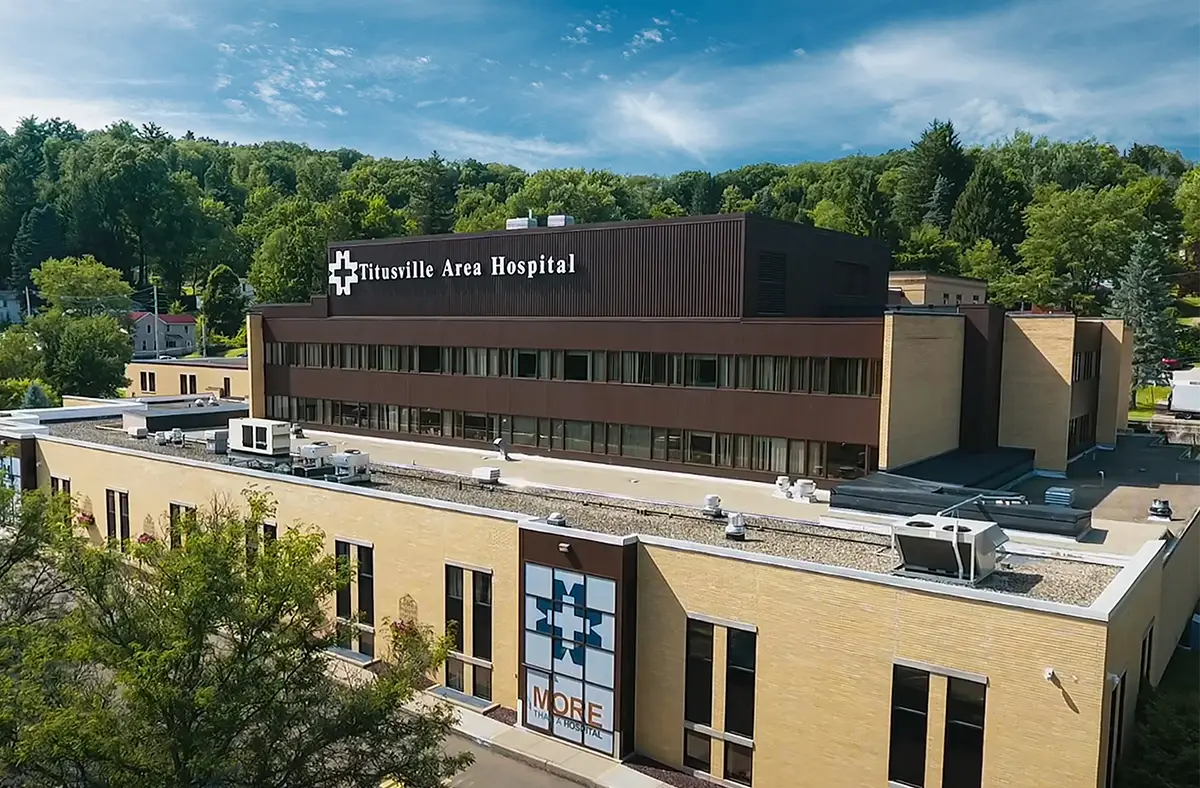Otolaryngology & Otorhinolaryngology Services
Treatment & Surgery for Ear, Nose & Throat (ENT) Issues
The ear, nose, and throat (ENT) are susceptible to various infections and physical damage. Titusville Area Hospital provides a wide range of treatments for these issues, including a number of otorhinolaryngology operations (ENT surgery). Our staff is prepared to run diagnostics and provide the treatment required to remedy nearly any problem that affects the ear, nose, or throat. Below you will find a full list of operations we perform.
Myringotomy
Ottis media with effusion (OME) is an ear issue in which fluids build up in the inner ear and may cause a serious infection. It usually occurs in children and is not to be taken lightly. A myringotomy is a procedure in which a slight incision is made in the eardrum to release excess fluids. This is commonly known as placing a tube in the patient’s ear.
OMEs often afflict children because of their undeveloped immune systems or a changing anatomical structure. It does not cause pain or a fever, and the only noticeable symptom would be a slight hearing loss. Watch for children that frequently turn up the volume of the TV as this could be an indicator.
Myringotomy and bilateral myringotomy (on both ears) is not typically a complicated surgery and can usually be done on an outpatient basis.
Tonsil & Adenoid Removal
Tonsil removal (tonsillectomy) is a fairly well-known procedure in the modern day. Tonsils are located on the lower part of the throat. When food enters the throat, the tonsils release white blood cells to fight infections and bacteria. The adenoids serve the same purpose, the only difference is that they are located on the roof of the throat.
While useful tools, if an individual experiences frequent ENT infections, the organs become overworked and swell, making it difficult to hear, swallow, and, in severe cases, breathe.
Symptoms a patient may need tonsil/adenoid removal include:
- Difficulty breathing
- Frequent sore throats
- Swollen lumps in the back of the throat
- Sleep apnea – periods during sleep where the affected stops breathing
- Ear pain
- Vomiting
Tonsillectomies and adenoidectomies are very common procedures. There are a few risks that may arise from unforeseen circumstances, but these are rare. Patients can typically return home on the same day as the surgery.
Septoplasty
The bridge between the nose that separates each nostril is called the nasal septum. It is made up of a small bone and hyaline cartilage. When these components become distorted and reduce the opening of one nostril, it is called a deviated septum. A person can be born with a deviated septum, develop one over time, or suffer an accident that displaces the cartilage. When the deviation becomes serious, the afflicted may experience nosebleeds, frequent sinus infections, and difficulty breathing. Even small deviations can worsen over time and should be fixed before it becomes an issue.
Septoplasty is the procedure to fix a deviated septum. Depending on the severity of the deviation, the procedure could be simple or complex. In most cases, however, patients are free to go home the same day after brief monitoring by hospital staff.
Thyroidectomy
A thyroidectomy is the removal of all, or a part of, an individual’s thyroid gland. The thyroid produces hormones that influence growth and development, as well as regulate metabolism. Thyroidectomies are typically performed if the gland becomes cancerous, enlarges into a painful goiter, or starts to overwork and produce an excess of hormones.
There are a few different types of thyroidectomies:
- Total thyroidectomy – A complete removal of the thyroid.
- Lobectomy – When only part of the thyroid needs to be removed and the surgeon removes the afflicted lobe.
- Partial lobectomy – On occasion, only part of a lobe needs to be removed.
- Completion thyroidectomy – In patients who have had a lobectomy or partial thyroidectomy before, over time a complete removal may be required. This could be anywhere from a few weeks to a few years from the original operation.
All of the above methods are very involved surgeries, and most patients will need to stay in the hospital for at least 24 hours before going home. Patients who undergo a total thyroidectomy will be required to take a daily pill in order to produce the hormones formerly created by the thyroid.
To schedule an appointment with TAH Ear, Nose, and Throat physician, Gabriel Te, MD please call the office at 814- 827-4377. The office is located on the first floor of Titusville Area Hospital at 406 W. Oak Street, Titusville, PA.
Ear Nose & Throat Locations



